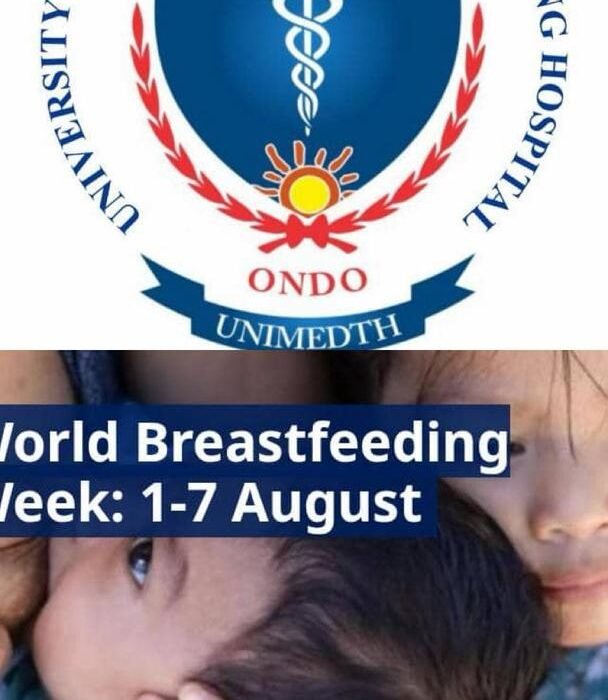UNIMED CHAMPIONS EXCLUSIVE BREASTFEEDING, DEBUNKS MYTHS, APPLAUDS GOVERNMENT SUPPORT

As the world commemorates World Breastfeeding Week, the University of Medical Sciences Teaching Hospital (UNIMEDTH), Ondo State, has reinforced its commitment to promoting exclusive breastfeeding, emphasizing its unmatched benefits to children, mothers, families, and the broader society.
In an exclusive interview with JobethMedia, UNIMED pediatric experts urged the public to reject common myths surrounding breastfeeding and praised the Ondo State Government for implementing six-month maternity leave and two-week paternity leave, moves they described as critical in fostering a healthy next generation.

BREASTFEEDING: NATURE’S FIRST IMMUNIZATION
Head of Department, Pediatrics, UNIMEDTH, Dr. Francis Akinkumi, described exclusive breastfeeding as “life-saving,” noting that it provides all the nutrition a child needs for the first six months of life.
“Breast milk contains fats, proteins, vitamins, water, and immunoglobulins,” Dr. Akinkumi explained. “These components cannot be fully replicated by formula. A breastfed child is more resistant to infections like diarrhea and respiratory illnesses, and tends to show better cognitive development.”
Similarly, a Pediatric Consultant at UNIMED, Dr. Afe Duke, also emphasized the economic and health-related advantages, highlighting that breastfeeding not only benefits the child but reduces household expenses significantly.
“A tin of formula now costs up to ₦20,000. Feeding a baby on formula can amount to over ₦60,000 per week. Breastfeeding, on the other hand, is free and priceless,” he stated.
BEYOND NUTRITION: HEALTH AND EMOTIONAL BENEFITS FOR MOTHERS
UNIMED’s experts also detailed several physiological and psychological benefits for breastfeeding mothers.
“It helps mothers return to their pre-pregnancy shape by burning stored fat,” said Dr. Akinkumi. “It stimulates uterine contractions through oxytocin, reducing postpartum bleeding and helping the uterus return to its normal size. It even lowers the risk of breast cancer.”
He also debunked the myth that women who undergo cesarean sections cannot breastfeed immediately.
“Even after a C-section, breastfeeding should begin within 30 minutes,” he insisted. “The breast is already prepared for milk production. If direct feeding isn’t possible, mothers can express milk and feed the baby.”
EXCLUSIVE BREASTFEEDING DEFINED AND DEMYSTIFIED
Exclusive breastfeeding means feeding an infant only breast milk for the first six months— no water, formula, or other foods, on demand, 8 to 12 times daily. Beyond this period, breastfeeding should continue alongside complementary foods up to two years or more, in line with WHO recommendations.

Dr. Duke cautioned against common concerns like babies sleeping through feeding times. “Some babies are less vocal about hunger. Mothers must wake such babies every two to three hours and encourage feeding. Active suckling is essential for milk production.”
He also addressed misconceptions around colostrum, the yellowish first milk often misunderstood in local communities as dirty.“Colostrum is not dirty. It’s rich in antibodies and vital for the newborn’s immunity. Myths like this must be actively debunked.”
WORKPLACE AND GOVERNMENT SUPPORT: THE GAME-CHANGER
The experts commended the Ondo State Government for extending maternity leave to six months and introducing two weeks paternity leave— both of which align with global best practices.
“This gives mothers time to bond with their babies and establish successful breastfeeding,” Dr. Akinkumi said, noting that fathers also need to be part of this journey.
He further appreciated the management of UNIMEDTH as it provides a crèche close to the workplace, ensuring mothers can breastfeed even after resuming work. Dr. Duke called on private organizations to emulate this support system by establishing breastfeeding-friendly environments, including lactation rooms and flexible duties for nursing mothers.
Read Also :
https://jobethmedia.com/wbdd-unimedthc-raises-alarm-on-blood-donation-crisis-in-ondo/
“Breastfeeding mothers should not be stigmatized. Providing a private, safe space for them to feed their babies— even in public or corporate spaces— makes a huge difference,” he urged.

BREASTFEEDING CHALLENGES AND REALISTIC SOLUTIONS
The UNIMED team addressed common challenges like breastfeeding pain and milk insufficiency. Dr. Akinkumi stressed that poor latching is often to blame.
“When a baby is not correctly latched onto the areola— the dark area around the nipple— it causes pain and poor milk flow,” stressing how proper positioning can solve this.”

He also reassured mothers that when babies begin rejecting breast milk after six to eight months, it’s usually because breast milk alone is no longer sufficient.
“From six months onward, breast milk becomes a supplement. Complementary foods must be introduced to meet calorie needs. If a baby weans naturally, it’s okay as long as they’re eating well.”
FAMILY & CULTURAL INFLUENCES
The doctors appealed to grandparents and caregivers to abandon outdated practices of feeding infants concoctions or water before six months.
“Animals like goats and dogs breastfeed exclusively. We, as higher beings, should do better. Breast milk is sufficient, and anything else can be harmful,” Dr. Akinkumi emphasized.
He urged families and communities to support nursing mothers emotionally and practically, warning that stress can negatively impact milk production.
The experts emphasized the need for nationwide advocacy, urging media, religious institutions, markets, and workplaces to take up the message.
“Breastfeeding is not just a personal matter; it’s a public health priority,” Dr. Duke pinpointed. “We must create sustainable systems that support mothers. This year’s theme— Prioritizing Breastfeeding: Building Sustainable Systems— is not just a slogan. It’s a mandate for all of us.”
Catch the full story and watch the insightful highlights here:
NB: World Breastfeeding Week is celebrated globally every August 1–7 to raise awareness and galvanize support for breastfeeding as a cornerstone of child survival and development.









